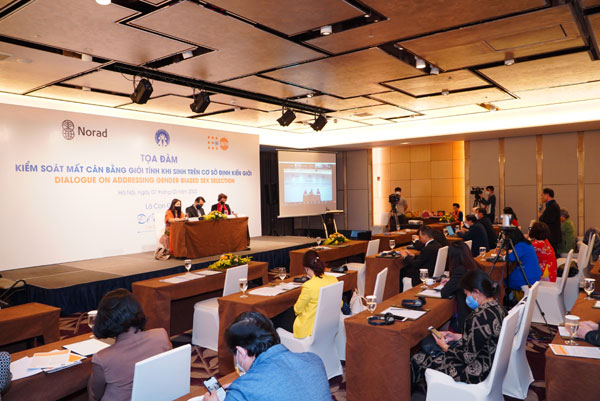Dialogue on addressing gender-biased sex selection and promoting men’s roles in social and family settings
(LĐXH)- It requires a stronger multi-sectoral cooperation among all parties concerned to challenge gender norms and stereotypes so as to address the issue of gender-biased sex selection (GBSS) in Vietnam. Central to this in terms of policy and programmatic interventions is to promote gender equality, increase the value of the girl child, and re-cast men’s roles in social and family settings.
These recommendations were among the conclusions of the Dialogue, which was held in Hanoi on March 7 by UNFPA in collaboration with the Ministry of Health to call for stronger actions. The GBSS is considered to result from son preference, fertility limitation, and the availability of reproductive technology. 

Under the framework of the Project: “Addressing Gender Biased Sex Selection and related harmful practices in Viet Nam,” which is funded by the Government of Norway for the period 2020-2022, the Dialogue shared international and innovative approaches to change socio-cultural norms leading to GBSS in Viet Nam. Men’s roles and participation in promotion for gender equality and to end GBSS, as well as the importance of strengthening the country’s coordination mechanisms for GBSS were also discussed.
The discussion focused on the findings of the review and research conducted by UNFPA, the General Statistics Office, and the Ministry of Health in the past years using the 2019 Population and Housing Census on the current GBSS situation and interventions in Vietnam.
Viet Nam has legal and policy frameworks and national programmes to promote gender equality and prohibit GBSS. However, there are some policy gaps and law enforcement challenges. The current policies focus largely on health interventions, and less on socio-cultural and fertility measures. The coordination mechanism among different Ministries is also essential.
Communication programmes in the future should aim at transforming social and gender norms with regard to preferences to boys over girls and the consequences of GBSS.
Communication programmes should target young people, especially boys, using diverse and creative communication channels, digital technology and social networks, in addition to traditional and established communication programmes.
Data from the 2019 Population and Housing Census estimates that every year, 45,900 girl births are missing in Vietnam, and there is evidence to suggest that this results from prenatal gender-biased sex selection.
It means that 45,900 girls are not born every year in Vietnam because they were found to be a girl. It is also estimates that among adults aged 15–49 years, there will be 1.5 million excess males by 2034, which can further increase to almost 2.5 million by 2059 (9.5 per cent of the corresponding male population) if the current sex imbalance at birth does not decline.
Vietnam’s unbalanced sex ratio at birth reached 111.5 male births for 100 female births in 2019 while the biologically “natural” or “normal” sex ratio is between 105 – 106 boys per 100 girls./.
Hong Minh
-
 Climate change threatens worker safety across the Asia-Pacific region
01-05-2024 09:28 49
Climate change threatens worker safety across the Asia-Pacific region
01-05-2024 09:28 49 -
 Minister Dao Ngoc Dung received the ASEAN’s General Secretary
24-04-2024 10:38 35
Minister Dao Ngoc Dung received the ASEAN’s General Secretary
24-04-2024 10:38 35 -
 Ha Nam province promotes career orientation for students
23-04-2024 14:28 49
Ha Nam province promotes career orientation for students
23-04-2024 14:28 49
-
 Career orientation workshop held to support Vietnamese students in US
26-03-2024 09:44 45
Career orientation workshop held to support Vietnamese students in US
26-03-2024 09:44 45 -
 Minister Dao Ngoc Dung received the Chairman of the Korea International Cooperation Agency
21-03-2024 14:14 48
Minister Dao Ngoc Dung received the Chairman of the Korea International Cooperation Agency
21-03-2024 14:14 48 -
 MoLISA proposing Japan to expand occupations to receive Vietnamese workers
18-03-2024 11:12 55
MoLISA proposing Japan to expand occupations to receive Vietnamese workers
18-03-2024 11:12 55








